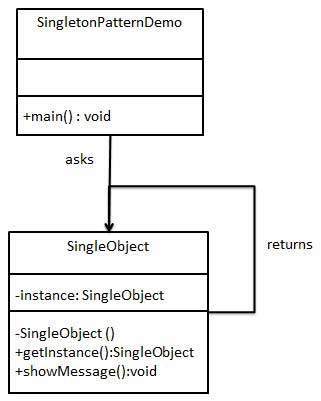Singleton pattern is one of the simplest design patterns in Java.
This type of design pattern comes under creational pattern as this
pattern provides one of the best ways to create an object.
This pattern involves a single class which is responsible to create an object while making sure that only single object gets created. This class provides a way to access its only object which can be accessed directly without need to instantiate the object of the class.
SingleObject class provides a static method to get its static instance to outside world. SingletonPatternDemo, our demo class will use SingleObject class to get a SingleObject object.

SingleObject.java
SingletonPatternDemo.java
This pattern involves a single class which is responsible to create an object while making sure that only single object gets created. This class provides a way to access its only object which can be accessed directly without need to instantiate the object of the class.
Implementation
We're going to create a SingleObject class. SingleObject class have its constructor as private and have a static instance of itself.SingleObject class provides a static method to get its static instance to outside world. SingletonPatternDemo, our demo class will use SingleObject class to get a SingleObject object.

Step 1
Create a Singleton Class.SingleObject.java
public class SingleObject { //create an object of SingleObject private static SingleObject instance = new SingleObject(); //make the constructor private so that this class cannot be //instantiated private SingleObject(){} //Get the only object available public static SingleObject getInstance(){ return instance; } public void showMessage(){ System.out.println("Hello World!"); } }
Step 2
Get the only object from the singleton class.SingletonPatternDemo.java
public class SingletonPatternDemo { public static void main(String[] args) { //illegal construct //Compile Time Error: The constructor SingleObject() is not visible //SingleObject object = new SingleObject(); //Get the only object available SingleObject object = SingleObject.getInstance(); //show the message object.showMessage(); } }
Step 3
Verify the output.Hello World!

No comments:
Post a Comment